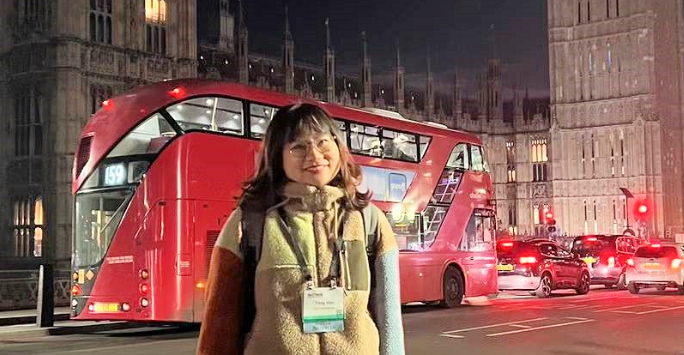
Yang Hao is a fourth year PhD student in the Department of Biochemistry, Cell and Systems Biology and is supervised by Professor Luning Liu. She recently attended the Bio-IT conference in London and told us about her trip.
As a doctoral candidate in the field of life sciences, my research focuses on the exciting realm of artificial intelligence (AI) assisted drug design. Specifically, my current endeavour revolves around the development of methods in the domain of high-throughput virtual screening, leveraging the power of deep learning.
Presenting my research
At a recent conference, I had the privilege of presenting a poster entitled ‘Using DeepPROTACs Model with Optimised Data Extraction and a New Feature to Predict Targeted Degradation of Proteins.’ This study delves into PROTACs, ternary complexes capable of ubiquitinating and degrading target proteins by recruiting E3 ubiquitin ligases. The focal point was the application of DeepPROTACs, a deep learning-based model, on an expanded dataset. Our efforts aimed to optimise the model by exploring improved data extraction methods and introducing the ubiquitin pocket as a novel feature. The development of PROTAC molecules is changing the traditional paradigm of drug development, bringing innovation and precision to disease treatment. This new therapeutic approach holds promise for the future of drug discovery and clinical therapy.
Conference Experience: Bio-IT World Conference & Expo 2023
Thanks to travel sponsorship from Institute, I had the privilege of attending the Bio-IT World Conference & Expo held in London. This event is renowned for showcasing technologies and analytical approaches that address challenges, expedite scientific progress, and shape the future of precision medicine. The conference spanned various fields, including life sciences, pharmaceuticals, clinical practice, healthcare, informatics, and technology, with dedicated sessions such as research and development in pharma and AI for pharma, storage infrastructure and cloud computing, data management and bioinformatics.
Of particular relevance to my research focus was the ‘AI for pharma’ track, providing a comprehensive view of the field. The atmosphere throughout the conference was remarkable, fostering global collaboration and knowledge exchange among experts and industry representatives. It presented an invaluable opportunity for me to engage with the latest advancements in my field, and I thoroughly enjoyed every aspect of the event.
The keynote speakers delivered high-quality presentations that deepened my understanding of my research domain. Overall, the conference not only provided insights into cutting-edge technologies but also enhanced my appreciation for the global efforts driving advancements in AI for pharmaceutical applications.